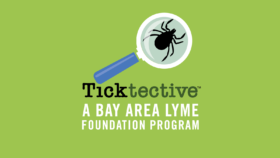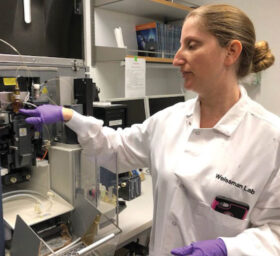By Bay Area Lyme Foundation FOR IMMEDIATE RELEASE
Media Contact:
Tara DiMilia, 908-947-0500, tara.dimilia@TMstrat.com
Bay Area Lyme Foundation Launches Ticktective™ Podcast
PORTOLA VALLEY, Calif., September 30, 2020 — Bay Area Lyme Foundation, a leading sponsor of Lyme disease research in the US, announces the launch of the Ticktective podcast and video series. Ticktective is a Bay Area Lyme Foundation program designed to investigate the latest scientific knowledge and advances in Lyme and tick-borne diseases. The podcast offers insightful discussion with researchers, physicians, patients, and thought leaders in the field.
“Because the science surrounding tick-borne disease is so complex and there are so many unanswered questions, Ticktective aims to share firsthand perspectives about the challenges of Lyme in ways that will intrigue more scientists, physicians and patients to join our battle towards making Lyme disease easy to diagnose and simple to cure,” said Linda Giampa, executive director, Bay Area Lyme Foundation.
There are more than 400,000 people diagnosed with Lyme disease each year in the US, and millions of Americans live with persistent Lyme disease (PLD) caused by an ongoing bacterial infection. The current “gold standard” diagnostic for Lyme disease misses up to 60% of cases of early stage Lyme disease, and if not treated promptly, Lyme may progress to a debilitating stage, becoming difficult, or impossible, to cure. Bay Area Lyme Foundation has funded over 100 research projects at 37 institutions across the US in a mission to find solutions for these patients.



 “I want to leave you with hope. I think we’re going to be unstoppable because I think that these are solvable problems. These are answerable questions. I think that there are already a lot of existing tools in immunology that just need to be brought into the fight, and we can change this.”
“I want to leave you with hope. I think we’re going to be unstoppable because I think that these are solvable problems. These are answerable questions. I think that there are already a lot of existing tools in immunology that just need to be brought into the fight, and we can change this.”  Any respectable pathogen that can establish a persistent infection needs to figure out your immune system to the point that it can evade it. The fact that it has persisted means that it was able to evade your immune clearance. And so, I got to that from a very interesting direction working on immune regulation, trying to understand these brakes on the immune response and how they impact the response to infection. The immune system has the power to kill you and obviously, nobody has any incentive for that to happen. So, there are a lot of mechanisms in place to put brakes on the immune system and reign it in. One of the huge developments in cancer over the last two decades has been reevaluating the question: can we take those brakes off? So in my postdoc, I was studying a particular checkpoint where this was turning into an exciting immuno-oncology target, and I said, ‘I want to look at how this checkpoint is used in infection.’ I realized that this checkpoint was being used to help you survive an acute infection, but created a vulnerability for pathogens to evade immune clearance and establish chronic infection much like it allows cancer cells to evade immune clearance. In an amazing collaboration with Irv Weissman, Balyn Zaro, and Jenifer Coburn we realized that the bacteria that cause Lyme disease manipulate this brake and that’s how I became fascinated with Lyme. But I also became concerned about turning off this brake in cancer patients because I was concerned about what would happen if you used this on cancer patients during an active infection. Indeed, the
Any respectable pathogen that can establish a persistent infection needs to figure out your immune system to the point that it can evade it. The fact that it has persisted means that it was able to evade your immune clearance. And so, I got to that from a very interesting direction working on immune regulation, trying to understand these brakes on the immune response and how they impact the response to infection. The immune system has the power to kill you and obviously, nobody has any incentive for that to happen. So, there are a lot of mechanisms in place to put brakes on the immune system and reign it in. One of the huge developments in cancer over the last two decades has been reevaluating the question: can we take those brakes off? So in my postdoc, I was studying a particular checkpoint where this was turning into an exciting immuno-oncology target, and I said, ‘I want to look at how this checkpoint is used in infection.’ I realized that this checkpoint was being used to help you survive an acute infection, but created a vulnerability for pathogens to evade immune clearance and establish chronic infection much like it allows cancer cells to evade immune clearance. In an amazing collaboration with Irv Weissman, Balyn Zaro, and Jenifer Coburn we realized that the bacteria that cause Lyme disease manipulate this brake and that’s how I became fascinated with Lyme. But I also became concerned about turning off this brake in cancer patients because I was concerned about what would happen if you used this on cancer patients during an active infection. Indeed, the